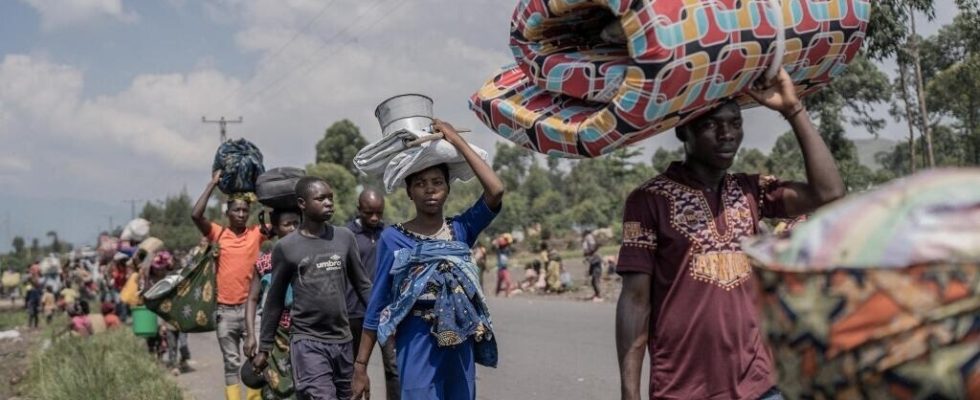Clashes between government forces and M23 rebels took place around Saké. This strategic town is located about twenty kilometers west of Goma, considered the last barrier on the road to the capital of North Kivu. Already on Monday, the United Nations Security Council was concerned about an escalation of violence in eastern DRC.
3 mins
All arrangements have been made. Saké is under the control of the Congolese armed forces, assures Patrick Muyaya, the spokesperson for the Congolese government, whose Minister of Defense visited Goma this Tuesday, the second visit in less than a week, for Jean-Pierre Bemba. According to the latter, everything is done to protect the populations of Saké, Goma and the surrounding areas. Kinshasa, he asserts, has set itself the objective of retaking all of the territories.
According to our information, the city center of Saké was controlled this Tuesday evening by the Congolese army, helped by armed groups, the wazalendo. The M23 rebels, who launched an offensive about a week ago, are said to be on the hills surrounding this town considered to be the last barrier before Goma and which is at the crossroads of several roads linking the capital to the rest of the province, and allowing it to be supplied. On social networks, the United Nations agency for humanitarian affairs (Ocha) says that humanitarian access is increasingly reduced in the area.
Read alsoFighting in eastern DRC: “Throughout Masisi, famine is setting in,” says local official
Early Monday evening, a bomb fell in a camp for displaced people at the northern exit of Saké, killing at least three people and injuring around ten others. This intensification of fighting has caused the displacement of thousands of civilians, recalls Stephen Goetghebuer, head of Doctors Without Borders missions.
[…] The displaced people are in reception sites, rather on the outskirts of Goma, to the north or west of Goma, towards Saké which is a front line today, so these camps remain very exposed […] The conditions of access to water, latrines but also to food, health and security are extremely precarious. In the structures supported by MSF, we treat on average 60 cases of sexual violence per day who come from these displaced person camps, therefore survivors of this violence. And that’s probably just a small proportion of the victims. Added to this is the anxiety of the next day since Goma is surrounded, it is not clear what the belligerents will want to do.
On Monday evening, during an emergency meeting, members of the UN Security Council condemned the M23 offensive and expressed renewed concern about the escalation of violence in the east of the country. They repeated their condemnation of all armed groups operating in the country and called “ all actors to resume dialogue to achieve a ceasefire “.
A Rwandan armored vehicle with radar and missile launcher
This call comes as the UN reveals new military means used by the M23 rebels. According to this internal UN document, a surface-to-air missile, presumed to be from the Rwandan Defense Forces, targeted a UN observation drone last Wednesday without hitting it.
The missile would have been fired from an armored vehicle in an area controlled by the M23, specifies the confidential document. Two aerial photographs, attached to the report, show an armored vehicle with a radar and missile launcher system deployed on its roof. The photos were taken about 70 km north of Goma by the drone targeted by the missile, indicate the authors of the report, who add that French military intelligence has confirmed that the armored vehicle is Rwandan.
The authors note an escalation of conventional forces engaged in the conflict. They believe that these new anti-aircraft means used by the M23 constitute a high-risk threat to all DRC government and MONUSCO aircraft in the region.
